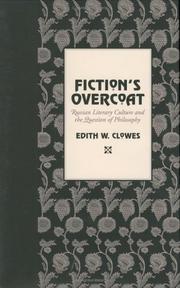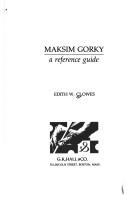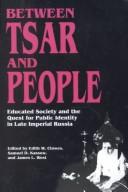| Listing 1 - 10 of 16 | << page >> |
Sort by
|
Book
ISBN: 0875801390 9780875801391 Year: 1988 Publisher: Dekalb Northern Illinois university press
Abstract | Keywords | Export | Availability | Bookmark
 Loading...
Loading...Choose an application
- Reference Manager
- EndNote
- RefWorks (Direct export to RefWorks)
Brigands and robbers --- Ethics in literature. --- Moral conditions in literature. --- Philosophy in literature. --- Russian literature --- Biography. --- History and criticism. --- Ethics in literature --- Moral conditions in literature --- Philosophy in literature --- History and criticism --- Nietzsche, Friedrich Wilhelm --- Nietzsche, Friedrich --- Nietzsche, Friederich --- Influence.
Book
ISBN: 069103222X 1306985013 0691608105 1400863538 0691636591 9781400863532 9780691032221 9780691608105 Year: 1993 Publisher: Princeton (N.J.): Princeton university press
Abstract | Keywords | Export | Availability | Bookmark
 Loading...
Loading...Choose an application
- Reference Manager
- EndNote
- RefWorks (Direct export to RefWorks)
In the three decades following Stalin's death, major underground Russian writers have subverted Soviet ideology by using parody to draw attention to its basis in utopian thought. Referring to utopian writing as diverse as Defoe's Robinson Crusoe, Dostoevsky's Notes from Underground, and Orwell's Animal Farm, they have tested notions of truth, reality, and representation. They have gone beyond their precursors by experimenting with the tensions between ludic and didactic art. Edith Clowes explores these "meta-utopian" narratives, which address a wide range of attitudes toward utopia, to expose the challenge that literary play poses to dogmatism and to elucidate the sense of renewal it can bring to social imagination. Using both structural analysis and reception theory, she introduces readers outside Russia to a fascinating body of literature that includes Aleksandr Zinoviev's The Yawning Heights, Abram Terts's Liubimov, Vladimir Voinovich's Moscow 2042, and Liudmila Petrushevskaia's "The New Robinsons.".Not advocating its own utopian alternative to current social realities, meta-utopian fiction investigates the function of a deep human impulse to imagine, project, and enforce alternative social orders. Clowes examines the technical innovations meta-utopian writers have made in style, image, and narrative structure that inform fresh modes of social imagination. Her analysis leads to an inquiry into the intended and real audiences of this fiction, and into the ways its authors try to move them toward more sophisticated social discourse.Originally published in 1993.The Princeton Legacy Library uses the latest print-on-demand technology to again make available previously out-of-print books from the distinguished backlist of Princeton University Press. These editions preserve the original texts of these important books while presenting them in durable paperback and hardcover editions. The goal of the Princeton Legacy Library is to vastly increase access to the rich scholarly heritage found in the thousands of books published by Princeton University Press since its founding in 1905.
Experimental fiction, Russian --- Russian fiction --- Utopias in literature. --- History and criticism. --- History and criticism --- -Russian fiction --- -Utopias in literature --- Utopian literature --- Russian literature --- Russian experimental fiction --- Utopias in literature
Book
ISBN: 0801461146 0801460662 9780801460661 0801448565 9780801448560 0801477255 9780801477256 9780801448560 9780801477256 9780801461149 Year: 2011 Publisher: Ithaca, NY
Abstract | Keywords | Export | Availability | Bookmark
 Loading...
Loading...Choose an application
- Reference Manager
- EndNote
- RefWorks (Direct export to RefWorks)
Since the dissolution of the Soviet Union in 1991, Russians have confronted a major crisis of identity. Soviet ideology rested on a belief in historical progress, but the post-Soviet imagination has obsessed over territory. Indeed, geographical metaphors-whether axes of north vs. south or geopolitical images of center, periphery, and border-have become the signs of a different sense of self and the signposts of a new debate about Russian identity. In Russia on the Edge, Edith W. Clowes argues that refurbished geographical metaphors and imagined geographies provide a useful perspective for examining post-Soviet debates about what it means to be Russian today.Clowes lays out several sides of the debate. She takes as a backdrop the strong criticism of Soviet Moscow and its self-image as uncontested global hub by major contemporary writers, among them Tatyana Tolstaya and Viktor Pelevin. The most vocal, visible, and colorful rightist ideologue, Aleksandr Dugin, the founder of neo-Eurasianism, has articulated positions contested by such writers and thinkers as Mikhail Ryklin, Liudmila Ulitskaia, and Anna Politkovskaia, whose works call for a new civility in a genuinely pluralistic Russia. Dugin's extreme views and their many responses-in fiction, film, philosophy, and documentary journalism-form the body of this book.In Russia on the Edge, literary and cultural critics will find the keys to a vital post-Soviet writing culture. For intellectual historians, cultural geographers, and political scientists the book is a guide to the variety of post-Soviet efforts to envision new forms of social life, even as a reconstructed authoritarianism has taken hold. The book introduces nonspecialist readers to some of the most creative and provocative of present-day Russia's writers and public intellectuals.
Territory, National --- Cultural geography --- Nationalism and literature --- National characteristics, Russian, in literature. --- Russian literature --- National territory --- Boundaries --- Human geography --- Literature and nationalism --- Literature --- History and criticism. --- Russia (Federation) --- Intellectual life

ISBN: 1501727028 9781501727023 0801441927 9780801441929 Year: 2004 Publisher: Ithaca (N.Y.): Cornell university press
Abstract | Keywords | Export | Availability | Bookmark
 Loading...
Loading...Choose an application
- Reference Manager
- EndNote
- RefWorks (Direct export to RefWorks)
If Dostoevsky claimed that all Russian writers of his day "came out from Gogol's 'Overcoat,'" then Edith W. Clowes boldly expands his dramatic image to describe the emergence of Russian philosophy out from under the "overcoat" of Russian literature. In Fiction's Overcoat, Clowes responds to the view, commonly held by Western European and North American thinkers, that Russian culture has no philosophical tradition. If that is true, she asks, why do readers everywhere turn to the classics of Russian literature, at least in part because Russian writers so famously engage universal questions, because they are so "philosophical"? Her answer to this question is a lively and comprehensive volume that details the origins, submergence, and re-emergence of a rich and vital Russian philosophical tradition.During the late nineteenth and early twentieth centuries, Russian philosophy emerged in conversation with narrative fiction, radical journalism, and speculative theology, developing a distinct cultural discourse with its own claim to authority and truth. Leading Russian thinkers-Berdiaev, Losev, Rozanov, Shestov, and Solovyov-made philosophy the primary forum in which Russians debated metaphysical, aesthetic, and ethical questions as well as issues of individual and national identity. That debate was tragically truncated by the events of 1917 and the rise of the Soviet empire. Today, after seventy years of enforced silence, this particularly Russian philosophical culture has resurfaced. Fiction's Overcoat serves as a welcome guide to its complexities and nuances.Historians and cultural critics will find in Clowes's book the story of the increasing refinement and diversification of Russian cultural discourse, philosophers will find an alternative to the Western philosophical tradition, and students of literature will enjoy the opportunity to rethink the great Russian novelists-particularly Dostoevsky, Pasternak, and Platonov-as important voices in the process of shaping and sustaining a new philosophy and ensuring its survival into our own age.
Philosophy, Russian --- Philosophy and psychology of culture --- Literature --- anno 1800-1999 --- anno 2000-2009 --- Russia

ISBN: 0816187223 Year: 1987 Publisher: Boston Hall
Abstract | Keywords | Export | Availability | Bookmark
 Loading...
Loading...Choose an application
- Reference Manager
- EndNote
- RefWorks (Direct export to RefWorks)
Digital
ISBN: 9780801460661 9780801448560 Year: 2011 Publisher: Ithaca, N.Y. Cornell University Press
Abstract | Keywords | Export | Availability | Bookmark
 Loading...
Loading...Choose an application
- Reference Manager
- EndNote
- RefWorks (Direct export to RefWorks)
Digital
ISBN: 9781400863532 9780691608105 Year: 2014 Publisher: Princeton, N.J. Princeton University Press
Abstract | Keywords | Export | Availability | Bookmark
 Loading...
Loading...Choose an application
- Reference Manager
- EndNote
- RefWorks (Direct export to RefWorks)
Digital
ISBN: 9781501727023 Year: 2018 Publisher: Ithaca, N.Y. Cornell University Press
Abstract | Keywords | Export | Availability | Bookmark
 Loading...
Loading...Choose an application
- Reference Manager
- EndNote
- RefWorks (Direct export to RefWorks)
Book
ISBN: 1609091876 9781609091873 0875807275 9780875807270 9780875807270 Year: 2016 Publisher: DeKalb
Abstract | Keywords | Export | Availability | Bookmark
 Loading...
Loading...Choose an application
- Reference Manager
- EndNote
- RefWorks (Direct export to RefWorks)

ISBN: 0691008515 0691031533 Year: 1991 Publisher: Princeton : Princeton University Press,
Abstract | Keywords | Export | Availability | Bookmark
 Loading...
Loading...Choose an application
- Reference Manager
- EndNote
- RefWorks (Direct export to RefWorks)
This interdisciplinary collection of essays on the social and cultural life of late imperial Russia describes the struggle of new elites to take up a "middle position" in society--between tsar and people. During this period autonomous social and cultural institutions, pluralistic political life, and a dynamic economy all seemed to be emerging: Russia was experiencing a sense of social possibility akin to that which Gorbachev wishes to reanimate in the Soviet Union. But then, as now, diversity had as its price the potential for political disorder and social dissolution. Analyzing the attempt of educated Russians to forge new identities, this book reveals the social, cultural, and regional fragmentation of the times. The contributors are Harley Balzer, John E. Bowlt, Joseph Bradley, William C. Brumfield, Edith W. Clowes, James M. Curtis, Ben Eklof, Gregory L. Freeze, Abbott Gleason, Samuel D. Kassow, Mary Louise Loe, Louise McReynolds, Sidney Monas, John O. Norman, Daniel T. Orlovsky, Thomas C. Owen, Alfred Rieber, Bernice G. Rosenthal, Christine Ruane, Charles E. Timberlake, William Wagner, and James L. West. Samuel D. Kassow has written a conclusion to the volume.
Intellectuals --- Middle class --- Intellectuels --- Classes moyennes --- History --- Histoire --- Russia --- URSS --- Russie --- Intellectual life --- Vie intellectuelle --- bourgeoisie (classe sociale) --- Élite (sciences sociales) --- vie intellectuelle --- 1917 --- Conditions sociales --- Acmeism. --- Bolshevism. --- Bulgakov, S. --- Café Pittoresque. --- Decembrists. --- Economic Discussions. --- Education Statute (1874). --- Free Economic Society. --- Free Russian Press. --- Gagarin family. --- Gilded Age, in Russia. --- Hobsbawm, E. --- Holy Synod. --- Jewish writers. --- Kantianism. --- Kornilov Affair. --- Luxemburg, R. --- Menshevism. --- Ministry of Internal Affairs. --- Moscow Legal Society. --- Peredvizhniki. --- aesthetism. --- agronomy. --- aristocracy. --- art patronage. --- autocracy. --- bureaucracy. --- business. --- cabarets. --- class struggle. --- cubo-futurism. --- dechristianization. --- division of labor. --- embourgeoisement. --- entrepreneurs. --- famine of 1891. --- gentry. --- guidebooks of Moscow. --- illegitimacy. --- industrialists. --- industrialization. --- industry. --- kupechestvo. --- liberalism. --- magic lantern show. --- merchant-entrepreneurs. --- nationalism. --- neo-Slavophilism. --- neoclassicism. --- obshchina. --- petroleum industry. --- professionalization. --- progressist movement. --- Rossīi︠a︡ --- Rossīĭskai︠a︡ Imperīi︠a︡ --- Russia (Provisional government, 1917) --- Russia (Vremennoe pravitelʹstvo, 1917) --- Russland --- Ṛusastan --- Russia (Tymchasovyĭ uri︠a︡d, 1917) --- Russian Empire --- Rosja --- Russian S.F.S.R. --- Russia (Territory under White armies, 1918-1920) --- Classe moyenne --- Petite bourgeoisie --- Bourgeoisie --- Hommes des classes moyennes --- Femmes des classes moyennes --- Classes sociales --- Élites (sciences sociales) --- Establishment --- Haute société --- Notables --- Société, Haute --- Dignitaires --- Élitisme --- Femmes du monde --- Personnel hautement qualifié --- Classes dirigeantes --- Hommes du monde --- Pouvoir communautaire --- Évergétisme --- Groupes sociaux --- Leadership --- Pouvoir (sciences sociales) --- Table des Rangs (Russie)
| Listing 1 - 10 of 16 | << page >> |
Sort by
|

 Search
Search Feedback
Feedback About UniCat
About UniCat  Help
Help News
News